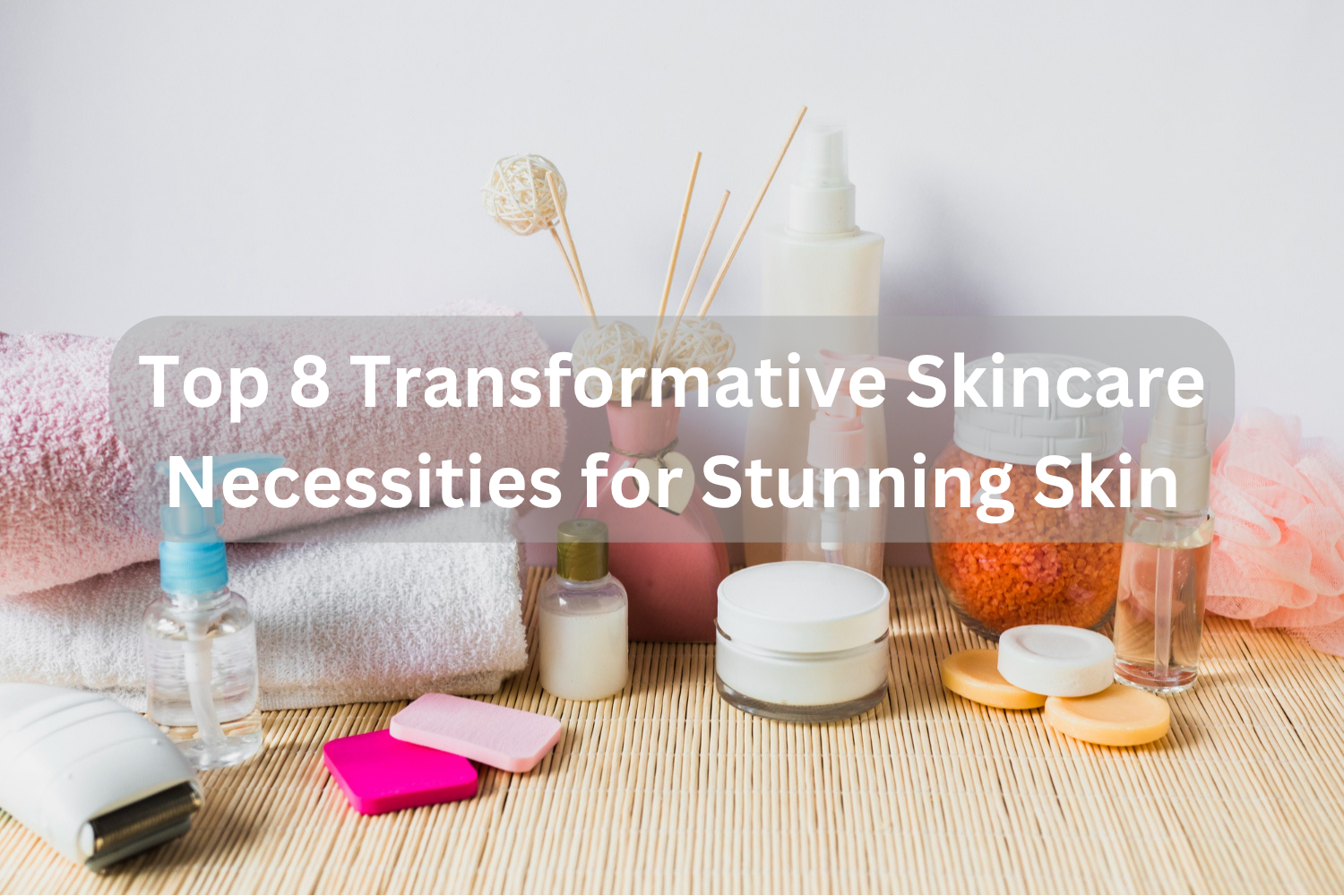Introduction
It isn’t a dream to achieve flawless, glowing skin. If you have the right skincare essentials anyone can transform their complexion. But the beauty product sea is huge. From moisturizers to treat fine lines, sunscreen to protect from the sun, to acne and afternoon hydration, each product has a job.
Below, this article breaks down the top eight, transformative skincare necessities that are absolutely essential for putting together a results driven routine. Combining to work on a range of different skin issues, these products aim to help your skin look as good as possible. This guide is designed for your skincare needs, regardless if you are new to skincare or a pro.
Cleanser: The Foundation of Any Routine
Cleansing is a way for you to enter your skincare journey. By the end of the day you’ve picked up dirt, oil and pollution on your skin clogging your pores and potentially leading to breakouts if left alone. Since they remove impurities, they provide a fresh base on which to build the rest of your skincare.
Choosing the Right Cleanser for Your Skin Type
- Oily Skin: A foaming or gel cleanser helps control excess oil production. Look for ingredients like salicylic acid to clear out pores.
- Dry or Sensitive Skin: Opt for cream-based or hydrating cleansers with soothing ingredients like aloe vera or ceramides.
- Combination Skin: Use a gentle cleanser that balances oily and dry areas without stripping the skin.
Morning vs. Evening Cleansing Habits
A mild cleanser in the morning removes the oils that your body was making during your sleep, leaving you with fresh skin. Oil along with a water based cleanser is double cleansing before bed to get rid of makeup, SPF, and environmental pollutants.
Exfoliator: Renew Your Skin’s Surface
Any skincare routine needs the game changer called Exfoliation. This eliminates the top layer of deceased skin cells, serving new skin cells to appear out and make your skin brillant.
Benefits of Regular Exfoliation
- Improves Skin Texture: Helps smooth rough patches and flakiness.
- Prevents Breakouts: Keeps pores clear, reducing blackheads and acne.
- Enhances Product Absorption: Allows serums and moisturizers to penetrate deeper for better results.
Chemical vs. Physical Exfoliants – Which One Suits You?
- Chemical Exfoliants: Alpha Hydroxy Acids (AHAs) like glycolic acid brighten the skin, while Beta Hydroxy Acids (BHAs) such as salicylic acid target acne.
- Physical Exfoliants: These contain small particles (e.g., sugar or rice bran) that physically scrub away dead cells. While effective, they can be harsh if overused, especially on sensitive skin.
Moisturizer: Lock in the Goodness
Moisturizer’s primary function is to hydrate and keep your skin barrier functioning. A good moisturizer makes your skin soft, smooth and plump, making dehydrated skin look dull and feel tight.
Why Hydration Is Crucial for All Skin Types
Even oily skin benefits from a moisturizer, as hydration prevents overproduction of sebum. When your skin feels dry, it compensates by producing more oil, leading to clogged pores and breakouts.
Daytime vs. Nighttime Moisturizers
- Day Moisturizers: Typically lightweight and often contain SPF to protect against sun exposure.
- Night Creams: Thicker and more nourishing, formulated with ingredients like peptides and ceramides to repair skin overnight.
Sunscreen: The Ultimate Anti-Aging Weapon
When it comes to products dermatologists swear by … there’s sunscreen. These UV rays are the cause of pre mature ageing, sun spots, and the increased risk of skin cancer. The best way to keep your skin youthful is to apply it daily.
Broad-Spectrum Protection Explained
A sunscreen that protects you against UVA and UVB rays is a broad spectrum. UVB rays damage the outer layer of your skin and are responsible for sunburns; UVA rays penetrate the skin almost to your bones and are where wrinkles and aging come from.
How to Integrate Sunscreen into Your Routine
Sunscreen should be applied in the last step of your morning skincare routine. If you are outdoors or exposed to sunlight, apply every two to three hours, wearing a protective garment or reapply after sweating or swimming.
Serums: Targeted Solutions for Specific Skin Issues
Serums are packed with active ingredients that address specific skin concerns, such as dullness, acne, or fine lines. Their lightweight texture allows them to penetrate deeply into the skin.
Vitamin C Serums for Brightening
Vitamin C has powerful antioxidant properties that brighten dark spots, will even out your skin tone and help produce collagen that will give your skin a luminous glow.
Hyaluronic Acid for Deep Hydration
This ingredient makes sure water gets attracted to the skin and then stays on the skin the whole day. Dry skin types benefit greatly from it.
Eye Cream: Care for the Delicate Eye Area
Fine lines, puffiness and dark circles develop most often around the eyes, making them the first area prone to signs of aging. Eye creams address these problems with ’light’ creams that are not suitable for the more sensitive eye area.
Preventing Dark Circles and Puffiness
Caffeine-based eye creams reduce puffiness by constricting blood vessels, while peptides promote collagen production to minimize dark circles.
Key Ingredients to Look for in an Eye Cream
- Retinol: Helps smooth fine lines.
- Hyaluronic Acid: Keeps the under-eye area hydrated and plump.
- Vitamin C: Brightens the area and reduces discoloration.
Face Masks: Pampering with Purpose
Masks have the advantage of being intense targeted boost for your skin. If your skin needs some extra hydration, oil control or brightening, there’s a mask for every skin concern.
Types of Masks – Clay, Sheet, and Overnight Masks
- Clay Masks: Absorb excess oil and detoxify pores, ideal for oily and acne-prone skin.
- Sheet Masks: Soak your skin in serums, providing hydration and nourishment.
- Overnight Masks: Work while you sleep, helping your skin repair and regenerate.
Frequency of Use for Best Results
Use masks once or twice a week to complement your regular routine. Overusing masks, especially clay ones, can strip the skin of natural oils and lead to dryness.
Retinoids: The Gold Standard for Skin Renewal
However, some of the most researched and recommended anti aging ingredients are retinoids including retinol. They are also very good at speeding up cell turnover, minimizing fine lines, and smoothing skin.
Benefits of Retinol for Anti-Aging
Collagen production is stimulated by retinol, which also reduces wrinkles and helps to produce firm skin. It fades hyperpigmentation too and makes your complexion evenly toned.
Tips for Beginners Using Retinoids
Begin with a low concentration so you do not irritate. Team your retinoids with an SPF product, and use only at night as they can make your skin more sensitive to sunlight. To avoid being dry and peeling, always follow up with a moisturizer.
Conclusion
Turning your skin around is not an event but an accumulation of behavioural practice that you need to follow in order to notice change. I’m talking to you about the building blocks of a successful skincare routine, this regular (yet sometimes inconvenient) routine that as a college student you want to continuously skip until you get home for summer break. Results won’t appear overnight, but they will never appear if you’re not consistent. Gradually stick to your routine and you’ll have healthier, glowing and younger looking skin.
Frequently Asked Questions
Q: What’s the ideal skincare routine for beginners?
A: A basic routine includes a cleanser, moisturizer, and sunscreen. Once comfortable, you can add serums, exfoliators, and masks.
Q: How often should I exfoliate my skin
A: 1-2 times a week is sufficient for most skin types. Over-exfoliating can cause irritation and dryness.
Q: Can oily skin types skip moisturizers?
A: No, skipping moisturizer can lead to increased oil production. Use a lightweight, oil-free moisturizer instead.
Q: How soon will I see results from using serums?
A: Depending on the serum, visible results can take 4-6 weeks. Patience and consistency are key.
Q: Do I need to reapply sunscreen throughout the day?
A: Yes, especially if you’re outdoors. Reapply every 2-3 hours to maintain protection.





